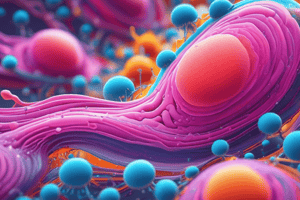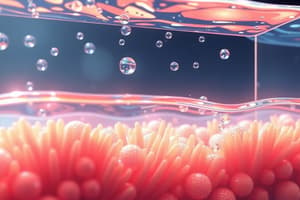Podcast
Questions and Answers
What is the function of aquaporins in cell membranes?
What is the function of aquaporins in cell membranes?
Facilitate the passage of water molecules without requiring energy
Define concentration and its influence on water molecules crossing cell membranes.
Define concentration and its influence on water molecules crossing cell membranes.
Concentration is a measure of solute amount per solvent volume, influencing the ease of water molecules crossing membranes
How do water molecules move across cell membranes?
How do water molecules move across cell membranes?
From areas of higher concentration to lower concentration through diffusion
What happens to cells when placed in a hypertonic solution?
What happens to cells when placed in a hypertonic solution?
Why does drinking seawater lead to cell damage?
Why does drinking seawater lead to cell damage?
What is the role of aquaporins in cell membranes?
What is the role of aquaporins in cell membranes?
What happens to cells when placed in a hypertonic solution?
What happens to cells when placed in a hypertonic solution?
How do extreme temperatures affect human cells?
How do extreme temperatures affect human cells?
Which direction do water molecules tend to move through a cell membrane?
Which direction do water molecules tend to move through a cell membrane?
What is the impact of drinking seawater on cells?
What is the impact of drinking seawater on cells?
Study Notes
- Human cells have specific conditions for survival, affected by extreme temperatures, salinity, acidity, or alkalinity.
- Cell membranes are selectively permeable, allowing some particles to pass through while blocking others.
- Aquaporins are special proteins in cell membranes that facilitate the passage of water molecules without requiring energy.
- Concentration, a measure of solute amount per solvent volume, influences the ease of water molecules crossing cell membranes.
- Water molecules tend to move from areas of higher concentration to lower concentration through a process called diffusion.
- Placing a cell in a hypertonic solution (excessive solute), hypotonic solution (deficient solute), or isotonic solution (equal solute) affects water movement across the cell membrane.
- Drinking seawater, due to its extreme salinity, can cause cells to shrink and die, as the body tries to remove excess salt through water uptake.
Studying That Suits You
Use AI to generate personalized quizzes and flashcards to suit your learning preferences.
Description
Test your knowledge on how cell membranes work and how water molecules move across them based on concentration gradients. Explore the effects of different solutions on cell survival and understand the role of aquaporins in facilitating water passage.





